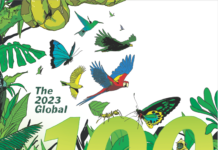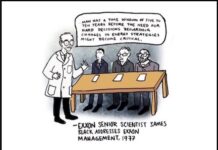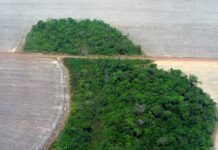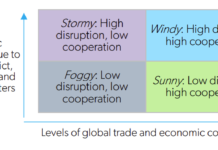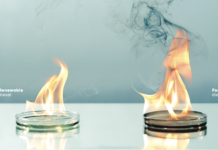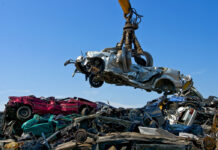I closed the last post by saying, “And so we have come to it: the greatest opportunity for enlightened courageous action that humanity has ever had.” Opportunity to do what? Nothing less than reshape civilization and build a collective future for humanity on a much stronger foundation than history has ever shown. To do so we have to fashion a different relationship among what I have called the five “Es” of human destiny: energy, economics, ecology, empathy and enterprise.
Where do we begin? By confronting head on the realization that much of what we are now doing in the world is not sustainable very far into the future. Among the multitude of challenges facing today’s young children as they grow into their future, the one that dominates all others, is sustainability.
This is the new great concern of the modern age. It first raised its head as an ugly question mark in the second half of the 20th century, and with every passing decade it exerts increasing psychological pressure as the evidence of our difficulty in sustaining what we have already achieved becomes more evident.
Sustainability
Now, I know that “sustainability” is not a very exciting word. It kind of implies plodding along in ordinary ways. I want to be clear that I am putting a much more positive spin on the word, implying a great challenge to be overcome, a grand mission to accomplish—the stuff for adventurers and questers. The task is to create something much better in the world than we have known to date, something worthy of human nobility. I hope you see what I mean. Young people can get really excited about such things.
Sustainability is a troublesome issue for those of us who are grandparents. We know we have been the beneficiaries of extraordinary abundance during our lifetimes, and because we care deeply about our children and grandchildren we instinctively want no less for them. And yet in our hearts, if not quite yet in our minds, we are beginning to understand that it can’t simply be “more” of what we have known, and that it must somehow be “different.”
But different how? Of course, we can’t know precisely how that question is going to be answered, because the difference will emerge from the interplay of circumstances as they unfold. But this is where the excitement comes in, the excitement of being on a quest of great importance, discovering how to do things in new and different ways. It certainly doesn’t mean sitting back and waiting to see what happens. Not if we care about our children and grandchildren.
What we must do now is look deeply for the root causes of today’s psychic unease, and use the experience of our lifetimes to offer guidance to the young. Along with such guidance we can provide our love and the support of what means we have to help these young ones in their task of fashioning the best of possible futures. That, I believe, is the true role of grandparents.
Where to Begin?
 In trying to unpack the issue of sustainability, I know of no better place to begin than with Karen Armstrong’s observation in The Great Transformation that “we risk environmental catastrophe because we no longer see the earth as holy, but regard it simply as a ‘resource’.” Now that’s a good strong way to say it. Bring in the concept of holiness, something sacred, something to stand before in awe and admiration. Armstrong is by no means alone in making such an observation about the Earth and the way we are treating it. Thomas Berry (The Great Work and The Dream of the Earth), Fritjof Capra (The Web of Life), Osprey Orielle Lake (Uprisings for the Earth), and many others would say as much. Armstrong, however, goes on to say that “unless there is some kind of spiritual revolution [emphasis added] that can keep abreast of our technological genius, it is unlikely we will save our planet.” “It is unlikely we will save our planet.”
In trying to unpack the issue of sustainability, I know of no better place to begin than with Karen Armstrong’s observation in The Great Transformation that “we risk environmental catastrophe because we no longer see the earth as holy, but regard it simply as a ‘resource’.” Now that’s a good strong way to say it. Bring in the concept of holiness, something sacred, something to stand before in awe and admiration. Armstrong is by no means alone in making such an observation about the Earth and the way we are treating it. Thomas Berry (The Great Work and The Dream of the Earth), Fritjof Capra (The Web of Life), Osprey Orielle Lake (Uprisings for the Earth), and many others would say as much. Armstrong, however, goes on to say that “unless there is some kind of spiritual revolution [emphasis added] that can keep abreast of our technological genius, it is unlikely we will save our planet.” “It is unlikely we will save our planet.”
Can you imagine saying that to your grandchildren? Of course, it’s not really the planet that needs saving, but rather the conditions on it that make it favourable for a successful global civilization. However, when a serious thinker like Karen Armstrong makes such a devastating assessment of our collective ability, it is time to admit we are in serious trouble and look for ways to take corrective action.
We witness continuing failure at international meetings like the 2009 Copenhagen Climate Conference to come to agreement on policies to address global warming and other sustainability issues. The fiasco is being repeated again at Durban at the COP17 negotiations on the Kyoto Protocol even as I write. At its core such disagreement comes from the place at which the negotiations begin: the view that humanity and all our great creations are somehow outside or separate from the natural world, which is merely a resource base for whatever we want to do.
While we argue about the resources and how to manage their exploitation, the whole biosphere on which all life, including human life, depends suffers enormous damage, such that serious thinkers like Armstrong and the others I have mentioned, and all of us, (if we allow ourselves to go there) begin to worry how much longer this can go on without seeing serious environmental collapse.
 Understanding this, what can grandparents do? As a starting point we can make sure that every grandchild’s library includes a copy of Dr. Seuss’s The Lorax. Even better, would be to sit down and read it with them and talk about its message: “Unless someone like you cares a whole awful lot, nothing is going to get better. It’s not.”
Understanding this, what can grandparents do? As a starting point we can make sure that every grandchild’s library includes a copy of Dr. Seuss’s The Lorax. Even better, would be to sit down and read it with them and talk about its message: “Unless someone like you cares a whole awful lot, nothing is going to get better. It’s not.”
If we encourage this value of caring about what happens to our world in children when they are young, they are most likely to carry it with them into the future, when they are in a position to act.
But just caring is not enough. We have to truly “feel” and “know” our connection to the Earth such that we are prepared to act now when we see our livest threatened by human greed and self-interest. Karen Armstrong is calling for a spiritual revolution in our time as significant as what occurred in several parts of the ancient world some 2500 years ago. This spiritual revolution ushered in “the great transformation” known as “the Axial Age” (meaning turning point) in which spiritual and philosophical geniuses like Confucius, the Buddha, Socrates, Jeremiah and the mystics of the Upanishads “pioneered an entirely new kind of human experience.” They put morality at the heart of spiritual life by teaching that the essence of being was to live the compassionate life. “Their objective was to create an entirely different kind of human being. All of the sages preached a spirituality of empathy and compassion; they insisted that people must abandon their egotism and greed, their violence and unkindness.”
This was the time when various formulations of the Golden Rule appeared in the different traditions, but the essence of it was everywhere the same: Do not do to others what you would not have done to you. Have you talked to your grandchildren lately about the Golden Rule and what it really means in today’s’ world?
Our Own Time and the Future
We have had the teachings of the Axial sages for many centuries now, and they have informed and guided societies around the world for the good. But quite suddenly we have come into a new time in which our great scientific advances and new knowledge have brought us face to face with a stark reality: our cumulative way of being and doing on the planet is destroying the web of life of which we are a part.
In Karen Armstrong’s words, “We need to rediscover the Axial ethos. In our global village we can no longer afford a parochial or exclusive vision. We must learn to live and behave as though people in countries remote from our own are as important as ourselves.” Even more important, we must find a way to design our human presence on the planet so that it becomes a seamless whole with the natural world. In Nature everything exists in a condition of delicate balance. Over the past few centuries of industrialization we have engineered a civilization that is outside this natural balance, and it now threatens to bring much of our achievement crashing down.
We are the only species who disrupts the balance in such an egregious way. If we ask ourselves why, we must acknowledge that it comes from our striving to accumulate more than others and more than we need. Our egoistic attitudes and self-interested behaviour combined with the power of our technology are more than the Earth can bear—and this is the only home we have.
What Then Must We Teach Our Grandchildren?

So this imperative, to live in balance with the natural world, is what we must teach our grandchildren. In doing so, we must also acknowledge that during our lifetimes, humanity lost its way. This will be a hard truth for many to admit, but the evidence is clear. I will be exploring this with you in great detail in subsequent posts. However, it is not too late to find our way back. We indeed need to rediscover the Axial ethos, but we don’t necessarily need to wait for new Axial sages—the voices of wisdom are everywhere around. They can be heard loud and clear in the “blessed unrest” that Paul Hawken describes in his book by the same name. They will appear again and again in this blog as we unpack the five “Es” of human destiny: energy, economics, ecology, empathy and enterprise.
A Superordinate Goal
For now I would like to close this post by identifying what I believe to be the key teaching that grandparents can give to their grandchildren: the need to work at accomplishing a superordinate goal, something bigger than ourselves and encompassing all of humanity. This is a theme seen in the work of Lynne McTaggart in The Bond, where she says that “coming together in small groups with a superordinate goal provides a social cohesion beyond money, jobs, or size of property.” To quote Karen Armstrong again: “We are meaning-seeking creatures and unlike other animals, fall very easily into despair if we cannot find significance and value in our lives.”
The challenge for our grandchildren will be to find meaning in their lives, not in the accumulation of more possessions than they need for a comfortable life, but in working together in small circles of human energy on the superordinate goal of bringing balance back to the planet, healing the Earth, and in the process creating a truly sustainable civilization, which includes a rethinking of many of the values, beliefs and practices in politics, economics and industrialization that have brought us to our present critical situation. Now, that’s an enterprise to get your teeth into! There will be much more on all of these issues in later posts.
Given our own life experiences we grandparents may not have the understanding we need to be the best teachers of our grandchildren, but we are they only grandparents they have. So we must do the best we can and dedicate our remaining years to our own new learning so that we can be as helpful as possible, seeking out and working on new objectives for a meaningful life, and above all, embracing the humility that sees that the greatest pleasure in life comes in the nurturing of success in others.
The ultimate success for our grandchildren will be learning to achieve something we have so far failed to do: create a sustainable human presence on the Earth.








